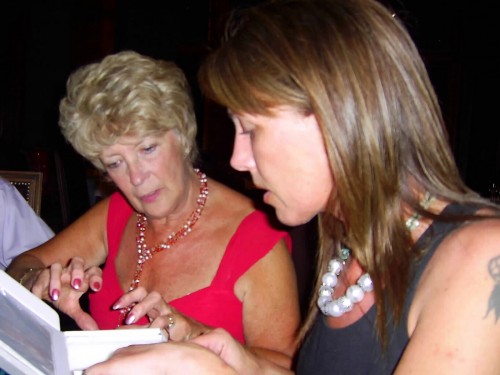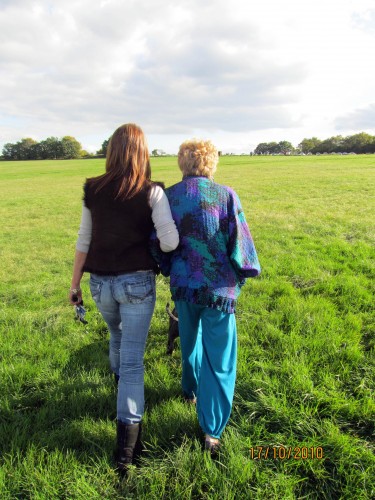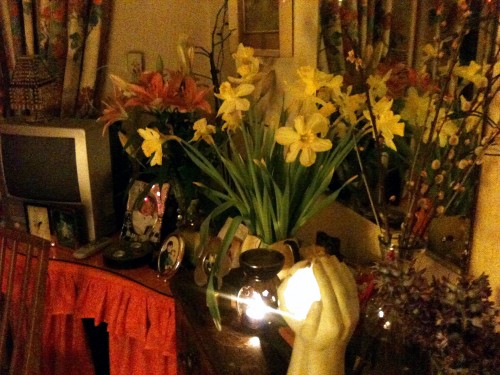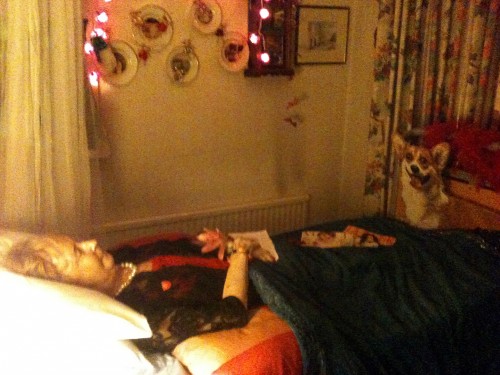
Fran and her Mum on her 70th
Fran Hall, a funeral industry practitioner of many years’ standing, much admired by the GFG, now works as a consultant. She is also the newly-appointed Chair of the Natural Death Centre. For years Fran successfully managed to balance detatchment and empathy in her professional life, so how did it feel when one of her own died? Here, she tell us.
It’s a rum thing, this death business. You can familiarise yourself all you like with the subject, read every book, article or blog there is to read, immerse yourself in working daily alongside the dying or the dead, consider yourself an expert on the ‘D’ word, and then suddenly you find yourself wrong-footed, knocked sideways out of theory by a swipe from the cold bony finger of the grim reaper.
For years I have grown a reputation for knowing all about death. From humble beginnings as a (completely untrained) funeral arranger, through qualifying with a diploma in funeral directing and then veering slightly sideways to participate in the fast expanding world of natural burial as a marketing manager, I have explored many avenues, and gained some notoriety within the business at the same time. I have sat with stunned, weeping families, bathed cold stillborn babies, collected broken bodies from the roadside or train tracks, cut decaying corpses down from loft hatches with white faced police constables standing by, dressed little children in their pajamas or favourite outfits, coordinated plans for huge ceremonies that needed roads closed and police escorts, conducted hundreds of corteges, written and delivered numerous ceremonies, and been intimately involved every time with the people I served.
I considered myself pretty sorted when it came to dealing with the emotional stuff, checking in with how each contact was impacting on me and those around me, crying sometimes, but not often – you find a way of assimilating some of the worst things you see, and you support each other, because people outside the hidden world of undertaking just don’t get it. Nothing really got through the defence system I created, not enough to impact on me. I was on top of it, cool with mortality, and therefore cool with the fact that at some point it would be my body on the tray in the fridge, or the body of someone that I loved…
And currently, the body of my mother is lying in a fridge somewhere within Kings College Hospital. She’s been there almost exactly a year. She died on January 23rd 2011, and what remains of her will probably be cremated sometime in 2014 in some godforsaken crematorium in South London. Her decision to leave her body to medical science was something we all applauded when she produced the paperwork back in 1999, such a thoughtful, generous thing to do. I had no idea of the actual effect it would have when the time came and we were left without the comfort of a ritualised farewell to her existence. That’s what I mean about being wrong-footed.
Let me go back. It was a mercifully brief illness that snuffed out the bright light that was our mother. Always the centre of attention, glamorous, bossy, difficult and charming, she was a true Leo, a powerfully dominant matriarch at the heart of our family. The drama of being the hostess of a Grade IV glioblastoma multiforme – the most deadly of brain tumours – was only fitting for someone who shone so brightly and who numbered her friends in the hundreds. She was fit and healthy in the August, and dead four months later – sixteen weeks exactly from diagnosis. In those sixteen weeks I realised that all my years of being alongside death had been just that, a journey beside others, a second hand experience. My practical knowledge was useful – I knew how to talk to the professionals, what questions to ask, how to get the help we needed, I was able to do stuff that my brothers couldn’t, because I knew my way round the system. Emotionally it was easier for me too, I had learned how to deal with grief over the years, knew what to expect – and yet being immersed in the swirl of feelings that ebbed and flowed during those four months was something quite new.

Walking on Epsom Downs on the last all-family day out
We were incredibly fortunate, the planets had aligned themselves in such a way that we were able to give our mother the best gift, a death at home in the house where she had lived for fifty years. Not that she discussed it at all – she never once spoke about death, she refused to be drawn into any conversation about her deteriorating health, somehow complying with hospital appointments, radiotherapy sessions and visits from the Macmillan Nurses without ever acknowledging the unspoken fact that everyone knew. Out of earshot my brothers and I had long conversations, each of us at different stages of acceptance of the inevitable, but in her presence we took our cue from her and kept conversation light and easy.
The cruel indignities of a failing body are very basic, very simple things that signpost the shortening path ahead. Gradually, gradually the world closed in – in October we walked as a big family group on the Downs, by November she could no longer walk up the stairs, by December she couldn’t raise herself from a chair. The hospital bed and commode arrived, furniture was shifted and a boudoir created in part of the living room, complete with ambient lighting, feather boas and beads, candles and flowers, and drapery over the mirror so she didn’t catch sight of her features bloated by drugs. Pleasures became little and intimate – no more grand dinners or shopping for bright coloured clothes, she was happy to have her nails painted and perfume applied and to gaze for hours out of the window. We didn’t know what she was thinking, but she seemed content with her thoughts, whatever they were. And while she passed each day quietly and comfortably, we three journeyed with her towards the end, each of us in the experience, part of it, not just observing it.
We were blessed with the kindest of carers to help us in the last few weeks, wonderful ladies who arrived every few hours with gentle hands and loving hearts. They bathed her and changed her, spoke softly and cheerfully to her, marvelled at her grace and serenity and shared jokes with us while they wrote their notes before slipping away. We were able to just be with her, offering food and drink, sitting with her while she slept, changing places with the various friends and family members who came every day to see her. It was a wonderful, dreadful time, a time in which we were able to contemplate what was coming and reach a kind of acceptance, safe in the familiar surroundings of the house we had all grown up in. I know how lucky we were, so many other families aren’t able to have such a softened approach to a death.

The day before she died all of her grandchildren were together in the room – separated from the bed where she lay semi-conscious by a DIY partition, nine of them sprawled on sofas and chairs, playing cards, eating pizza, fooling about quietly to the accompaniment of ‘Nan’s music’. Probably the last sound that she heard was their laughter – it was surreal, and yet so right to have them all being normal just feet away from their dying grandmother. Each of them came and went as they wanted to her bedside, holding her hand, stroking her hair. When the older ones left that night, they all knew they wouldn’t see her again and this was one of the hardest things, seeing my children leave the house stumbling with grief and tears and holding each other tightly. The little ones wanted to stay, so we made beds for them on the floor, and they slept as we adults sat vigil with our mother as she died.
You don’t get much preparation for what to do once someone has died. I don’t mean the immediate practical stuff, like closing their eyes, laying them back onto the pillow, wiping their mouth; I mean you don’t really know what to do with yourself. She had left us irrevocably, gone. Completely gone. There were six of us in the house, my brothers and sisters in law, my mother’s dearest friend and me. Seconds ago there had been seven. It was the opposite of being in a delivery suite when a baby enters the world. Bizarre thoughts like that arise unbidden as you experience the profundity of what has occurred. Someone made tea, someone else went off upstairs to be alone, my nephews were gently woken and told, as we had promised them we would, and the adults then had to look after them and try and assuage their grief – a welcome distraction I think. After an hour or so I went out and walked in the freezing January night to an ancient oak tree a mile or so away and just sat at the foot of the huge trunk and looked at the stars, without thinking. It was beyond thoughts, that night. And beyond feelings too – it was just elemental and unconstructed and without boundary, it was death.
In the morning my sister in law and I laid my mother’s body out, washing her and dressing her and making her look lovely again after the ravages of the night before. We hadn’t rushed to call a doctor to certify the death, and we didn’t rush to call a funeral director either, choosing to keep her body at home all day to allow other family members and friends to come and be with her. This was in direct disobedience of the ‘donation to medical science’ rules, but we judged it cold enough to take the risk, and fortunately for us we got away with it (I wouldn’t recommend it to others though if they needed to ensure the donation is accepted, I had to be somewhat economical with the truth on the phone the following morning!)

Eventually, on the Monday afternoon, an undertaker friend of mine came and collected mum’s body and drove her off to her new role as a cadaver for medical students to practice their skills on. This was yet more uncharted territory, and something that I found really difficult to accommodate. I felt denied the opportunity to ‘lay her to rest’, and really struggled to get my head round the absence of a funeral. After all, that was what I did, I made funerals happen – and I wasn’t to be allowed to for my own mother – that was a real tough one for me. I ended up by substituting a funeral with what was to become the most extraordinary memorial service for her a couple of months later.
It’s been a strange journey, this one from ‘knowledge’ through experiencing to where I am now. Probably the best summary is that I am older and a little wiser – an orphan has more insight than a funeral expert. I’m still buying books on death and learning all the time from others, but the process of being alongside my dying mother has taught me more than anything.
Today is the anniversary of Fran’s Mum’s death.
Contact Fran at franhall [at]sky [dot] com




